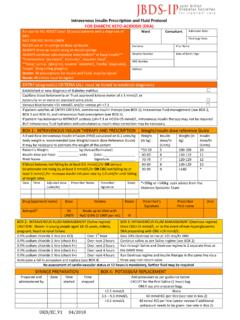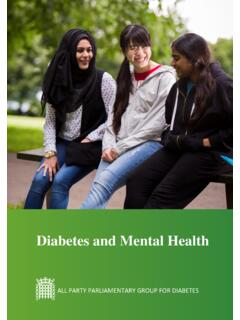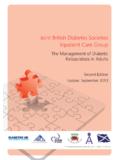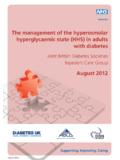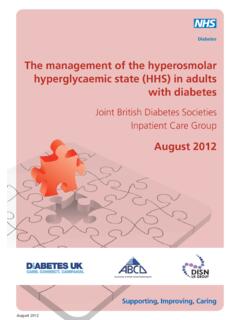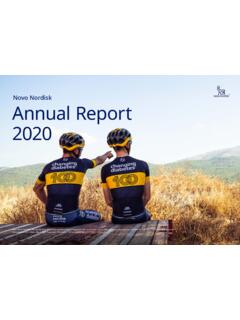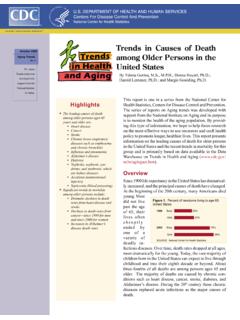Transcription of The Hospital Management of Hypoglycaemia in ... - Diabetes …
1 The Hospital Management of Hypoglycaemia in Adults with Diabetes Mellitus4th editionRevised January 20202 This document is coded JBDS 01 in the series of JBDS documents: Other JBDS documents:Inpatient care of the Frail Older Adult with Diabetes October 2019 JBDS 15A good inpatient Diabetes service July 2019 JBDS 14 The Management of Diabetes in adults and children with psychiatric disorders in inpatient settings May 2017 JBDS 13 Management of glycaemic control in pregnant women with Diabetes on obstetric wards and delivery May 2017 JBDS 12 Management of adults with Diabetes on the haemodialysis unit April 2016 JBDS 11 Discharge planning for adult inpatients with Diabetes October 2015 JBDS 10 The use of variable rate intravenous insulin infusion (VRIII) in medical inpatients October 2014 JBDS 09 Management of hyperglycaemia and steroid (glucocorticoid)
2 Therapy October 2014 JBDS 08 Admissions avoidance and Diabetes : guidance for clinical commissioning groups and clinical teams December 2013 JBDS 07 The Management of the hyperosmolar hyperglycaemic state (HHS) in adults with Diabetes August 2012 JBDS 06 Glycaemic Management during the inpatient enteral feeding of stroke patients with Diabetes June 2012 JBDS 05 Self- Management of Diabetes in Hospital March 2012 JBDS 04 Management of adults with Diabetes undergoing surgery and elective procedures: improving standards April 2011 JBDS 03 The Management of diabetic ketoacidosis in adults revised September 2013 JBDS 02 These documents are available to download from the ABCD website at and the Diabetes UK website at AuthorshipWhat has changed since the previous guideline?
3 IntroductionClinical features Risk factors for Hypoglycaemia Potential causes of inpatient Hypoglycaemia Management of Hypoglycaemia Treatment of Hypoglycaemia 19-25 Adults who are conscious, orientated and able to swallow 19 Adults who are conscious but confused and able to swallow 20 Adults who are unconscious or having seizures 21-22 Adults who are Nil by Mouth 23 Adults requiring enteral feeding 24-2526272728-29303132 When Hypoglycaemia has been successfully treated Audit standards Guideline update ReferencesFurther reading Traffic light algorithm for the treatment of Hypoglycaemia Flow chart for the treatment of Hypoglycaemia AppendicesAppendix 1 List of insulins currently available 33 Appendix 2 Example of contents of hypo box 34 Appendix 3 Hypoglycaemia audit form 35-36 Appendix 4 Example of treatment sticker 37 Appendix 5 Injectable medicines monograph 38-394 ForewordHypoglycaemia
4 Continues to be one of the most feared short-term complications of Diabetes mellitus amongst people with Diabetes , healthcare professionals and lay carers alike. For people receiving insulin or sulfonylurea therapy as treatment for their Diabetes , evidence would suggest that achieving good glycaemic control while avoiding Hypoglycaemia remains very difficult. Intercurrent illness and the Hospital setting compounds this situation with access to meals and snacks often being very different compared with the home people with Diabetes are not admitted to Hospital with a Diabetes related issue and can thus be under the care of any medical or surgical specialty; this can result in them being treated by staff without specialist Diabetes knowledge.
5 In response to these issues this guideline was produced by the Joint British Diabetes societies (JBDS) to offer clear guidance for the effective Management of Hypoglycaemia in Hospital . It appears clear that Trusts have welcomed this with 92% of 118 hospitals responding to a SurveyMonkey questionnaire suggesting they have used it as the basis for Hypoglycaemia Management within their Hospital . A review of the ABCD and Diabetes UK websites showed that this guideline has been downloaded more than 188,000 times. It is reviewed regularly and updated in response to new evidence, national changes and comments received. The authors would like to thank all involved for their comments and would encourage people to contact us with any further is the fourth iteration of this guideline (Original March 2010, September 2013 and April 2018).
6 We hope that all healthcare professionals involved in the care of Diabetes patients find this a useful document. By adopting the principles and adapting where necessary, these guidelines should help ensure good quality, timely and effective treatment for people with authorship Esther Walden (RGN), Norfolk and Norwich University Hospitals NHS Foundation TrustDebbie Stanisstreet (RGN), East and North Hertfordshire NHS TrustDr Alex Graveling, Aberdeen Royal InfirmarySupporting organisations Association of British Clinical Diabetologists (ABCD), Chair: Dr Dinesh Nagi (Yorkshire) Diabetes Inpatient Specialist Nurse (DISN) UK Group, Chair: Esther Walden (Norwich) Diabetes UK: David Jones, Assistant Director of Improvement, Support and InnovationJoint British Diabetes societies (JBDS) for Inpatient Care, Chair.
7 Professor Ketan Dhatariya (Norwich) Writing group Professor Stephanie Amiel, King s College Hospital NHS Foundation TrustDr Clare Crowley, Oxford University Hospitals NHS Foundation Trust Dr Ketan Dhatariya, Norfolk and Norwich University Hospitals NHS Foundation TrustProfessor Brian Frier, The Queen s Medical Institute, University of EdinburghDr Rifat Malik, King s College Hospital NHS Foundation TrustDistributed and incorporated comments from: Diabetes Inpatient Specialist Nurse (DISN) UK Group membershipJoint British Diabetes societies (JBDS) Inpatient Care Working Group membersDiabetes UKDiabetes UK User GroupAssociation British Clinical Diabetologists (ABCD)The Diabetes Management & Education Group (DMEG) of the British Dietetic AssociationUnited Kingdom Clinical Pharmacy Association (UKCPA) Diabetes & Endocrinology Committee Guild of Healthcare Pharmacists (GHP)Royal College of Physicians (RCP)Training, Research and Education for Nurses in Diabetes (TREND UK)Ambulance Service Network6 Wider distribution.
8 Royal College of NursingJBDS IP Review GroupDr Ahmed Al-Sharefi, Imperial Healthcare NHS TrustDr Belinda Allan, Hull and East Yorkshire Hospital NHS Trust Erwin Castro, East Sussex Healthcare NHS TrustDr Umesh Dashora, East Sussex Healthcare NHS TrustDr Parijat De, Sandwell and West Birmingham NHS TrustProfessor Ketan Dhatariya (Norwich), Chair, Joint British Diabetes societies (JBDS) for Inpatient CareDr Daniel Flanagan, Plymouth Hospitals NHS Trust Dr Stella George, East and North Hertfordshire NHS Trust Dr Sandip Ghosh, University Hospitals Birmingham NHS Foundation TrustDr Masud Haq, Maidstone and Tunbridge Wells NHS Trust Dr Christopher Harrold, University Hospitals Coventry and Warwickshire NHS TrustJune James, University Hospitals of Leicester NHS Trust David Jones, Diabetes UKDr Meera Ladwa, Kings College Hospital NHS Foundation TrustDr Anthony Lewis, Belfast Health and Social Care Trust, Northern IrelandDr Sue Manley, University Hospitals Birmingham NHS Foundation TrustDr Omar Mustafa, Consultant Diabetologist, King s College Hospital NHS Foundation TrustDr Dinesh Nagi.
9 Mid Yorkshire Hospitals NHS TrustPhillip Newland-Jones, University Hospitals Southampton NHS Foundation TrustProfessor Gerry Rayman, The Ipswich Hospital NHS Trust Dr Stuart Ritchie, NHS Lothian Dr Aled Roberts, Cardiff and Vale University Health BoardProfessor Mike Sampson (Norwich) Norfolk and Norwich University Hospitals NHS Foundation TrustProfessor Alan Sinclair, Director, Diabetes Frail Ltd, and King's College, LondonDebbie Stanisstreet, East and North Hertfordshire NHS Trust Esther Walden, Norfolk and Norwich University Hospital NHS Foundation Trust Dr Peter Winocour, East & North Hertfordshire NHS TrustWith special thanks to Christine Jones for her administrative work and help with these guidelines and with JBDS-IP7 What has changed since the previous guideline?
10 In terms of specific guidance not much has changed, however; The algorithms for the treatment of Hypoglycaemia as well as the list of treatments for treating Hypoglycaemia in adults requiring enteral/parenteral feeding have been amended to be in line with other key Diabetes documents. In response to the government s sugar tax on soft drinks Lucozade and Ribena have been removed as suitable examples of quick acting carbohydrates. The fact that glucagon can be given without a prescription for the purpose of saving a life has been highlighted (although this information was in the original guideline). Throughout the guideline where 4mmol had previously been written this has been changed to to avoid any confusion.






